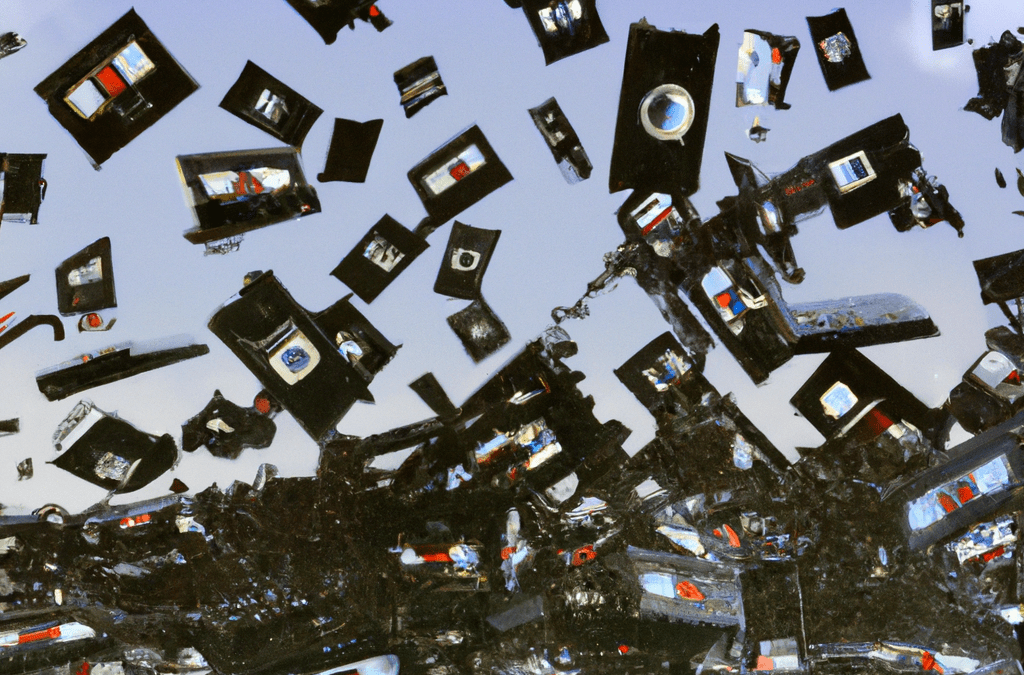Videotapes were once a popular format for home video recordings and other personal media. They provided a way for people to preserve their memories in a way that was not possible before. However, as time passes, these tapes can deteriorate and become damaged. This leads to a loss of quality or even a complete loss of data. In this blog post, we’ll explore why videotape deterioration is a real threat to your family’s memories. Here’s what you can do to protect them.
The Importance of Preserving Family Memories
Family memories are an important part of our personal histories. They help us to remember important events and moments in our lives. They also provide a sense of connection to our past. Memories serve as a bridge to future generations, helping to pass on stories and traditions to our children and grandchildren.
Videotapes were once a popular way to preserve these memories. They provided a way to capture important events such as birthdays, weddings, and family vacations. However, as time passes, these tapes can deteriorate, becoming brittle, faded, or damaged. This can cause a loss of data and a loss of quality. It can be difficult or even impossible to relive those important memories.
The Causes of Videotape Deterioration
There are several factors that can contribute to the deterioration of videotapes over time. Here are a few of the key causes:
- Environmental factors: Videotapes are sensitive to environmental factors such as heat, humidity, and exposure to light. If stored in a humid or warm environment, tapes can develop mold or other types of damage. Exposure to sunlight or fluorescent light can also cause the tapes to fade or lose color.
- Magnetic fields: Videotapes are sensitive to magnetic fields. This can cause data loss or other types of damage. Exposure to magnets, electromagnetic fields, or other sources of interference can damage the tapes and cause them to degrade over time.
- Wear and tear: Over time, videotapes can become worn or damaged from repeated use. This can cause the tapes to become brittle or break. It can cause the magnetic tape to become stretched or damaged.
- Manufacturing defects: Some videotapes may have been manufactured with defects. These can cause deterioration over time. For example, some tapes may have been produced with glue that can degrade and damage the magnetic tape.
The Risks of Losing Family Memories
When videotapes deteriorate and become damaged, the memories that they contain could be lost forever. Once the data is lost, it cannot be recovered, and those important moments and events will be gone. This can be especially devastating for families, as they lose the ability to relive and share those important memories with future generations.
The risks of losing family memories are especially high for those who have not taken steps to preserve their videotapes. Many people assume that their tapes will last forever, and they don’t take steps to protect them from damage or deterioration. However, as time passes, the risks of losing those memories increases, and it becomes more difficult to preserve the tapes as they become more brittle and fragile.
The Benefits of Converting Videotapes to Digital Formats
One of the best ways to protect family memories and prevent the loss of important events is to convert videotapes to digital formats. Digital formats are less prone to deterioration than analog tapes, and they can be stored and backed up more easily. There are several benefits to converting your videotapes to digital formats:
- Better quality: Digital formats provide better quality than analog tapes, with clearer images and higher quality audio. This can help to preserve the memories and make them more enjoyable to watch.
- Easier to share: Digital formats can be shared more easily with friends and family, making it easier to share those important memories with others. This is especially true in the digital age, where videos can be easily shared online or through social media.
- Easier to store: Digital formats can be stored more easily than videotapes, which can take up a lot of space. Digital files can be stored on a computer or in the cloud, freeing up physical space and reducing clutter.
- Future-proof: Digital formats are future-proof, meaning that they are less likely to become obsolete than analog formats. This can help to ensure that the memories are preserved for future generations.
- Easy to edit: Digital formats are easy to edit and manipulate, making it possible to create new versions of the memories or to add special effects or music.
The Conversion Process
Converting videotapes to digital formats is a relatively simple process, and can be done at home using a computer and a video capture device. However, for those who don’t have the necessary equipment or expertise, there are video transfer services that can do the job for you.
These services offer a variety of options for converting videotapes to digital formats, including DVD, Blu-Ray, digital files, and online storage. They use specialized equipment and software to ensure that the highest quality transfer is achieved, and they can often improve the quality of the original tape by removing noise and enhancing color and contrast.
The process of converting videotapes to digital formats typically involves several steps. First, the tapes are inspected and cleaned to remove any dirt or debris that could cause damage to the equipment. Then, the tapes are transferred to a digital format using a video capture device and specialized software. Finally, the digital files are edited and enhanced to ensure that they are of the highest possible quality.
Conclusion
Preserving family memories is an important part of our personal histories, and videotapes have played an important role in capturing and preserving those memories. However, as time passes, these tapes can deteriorate and become damaged, leading to a loss of quality or even a complete loss of data.
Converting videotapes to digital formats is one of the best ways to protect family memories and prevent the loss of important events. Digital formats are less prone to deterioration than analog tapes, and they can be stored and backed up more easily. They also provide better quality, making it possible to enjoy those memories for years to come.
Whether you choose to convert your videotapes to digital formats on your own or using a video transfer service, the important thing is to take steps to preserve those important memories before it’s too late. By doing so, you can ensure that those memories are preserved for future generations and that they continue to provide joy and nostalgia for years to come.


Trackbacks/Pingbacks